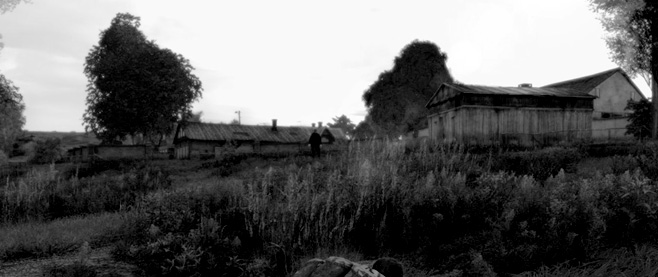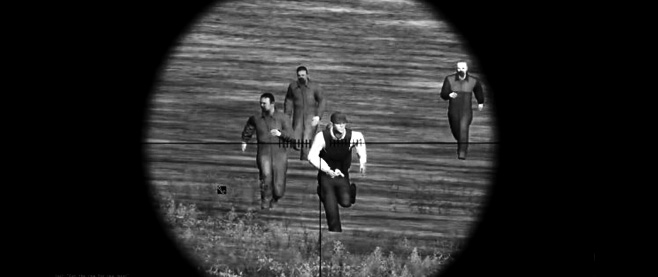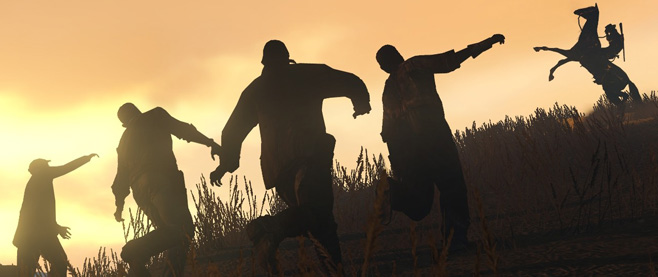All in My Head: A DayZ Journal – Part 2
Part Two: Cold Comfort, Colder Heart
Calming words are cold comfort in DayZ. When I left a fellow survivor to die alone, only to loot his body afterwards and tell those who would listen of what I’d done, I knew I had slipped. At first, I shirked it and tried to shake it off. I told myself I still had the option to back down, to back away, to back out – to shut the game off and never finish the experiment I’d set out on.
Instead, I played along.

I find my way to the barn a few days after the incident in the dark. I crawl through a side door and up some stairs, and I take a few moments to catch my breath and try to relax in a world where every footstep could be my last. I have no water, no food either. The icons blinking at the bottom of my screen are like little alarms, but I don’t have the requisite items to turn them off: they tell of my imminent death.
The nation of Chernarus doesn’t offer much silence, however, and a few minutes later I hear footsteps again. A survivor walks in and up the stairs on the opposite side of the barn. He hasn’t seen me yet.
I pull out my gun, a small Makarov with one magazine of ammunition on my belt, and I aim it at his head. My heart races a little, and a demon and an angel fight on either side of me. My moment is escaping; the man fidgets a little, he’s drinking the water from the canister.
I do it. I pull the trigger. Not once, but repeatedly, just to ensure that I leave myself no option of turning back. No explanations like, “Sorry, the server was laggy,” or “Oops, missed that zombie, huh!?” No excuses for me now – I kill the man in the barn and loot his corpse for a can of beans and some water – just enough to keep me alive a little longer.
As I’ll come to learn, this world is just one big ecosystem where players live off of the fortune, or misfortune, of others. DayZ is one big, brutal sprint relay, where the baton is passed one to another, willingly or not, as players feed off of one another. The zombies are simply garnish.
I start to question what would have happened if I hadn’t killed him. It haunts me as a great unknown. My mind races with the million possible lives I, and he, could have led.

“Do I kill him?” I asked Twitter.
At this point, I had assumed the mantle of Bandit – perhaps not proudly, but fully – and it was the only way I could continue. Over the following days, I began my killing spree. I killed ruthlessly and without question. One after the other.
Some I shot before they could shoot me. Others I offered sweet reassurances to, like I had done all those years ago to that man in the bank. The survivors who trusted got a bullet through the back of their heads while they looted zombies. Their screams over the chat cursed my name and chased me as I ran. I thought of the new players who would see those messages and wondered if seeing my name set their hearts racing.
Twitter was just another place to broadcast my new, unnerving voice. Involving others outside of the game became a part of the process. Make no mistake – I was not crowdsourcing morality. I was encouraging people to participate in the game that I was making out of hunting people. Some would say, “Kill him!” Others would encourage my inclinations to torture and tell me, “Not now, but soon.”
DayZ, as an experience, is more than whatever transpires on screen. I remembered Stephen King’s words from On Writing as my murderous ways continued.
“Description begins in the writer’s imagination, but should finish in the reader’s.”
It’s a single line that grew to prominence in my mind. It married nicely with one of King’s quotes:
[pullquote]I thought of the new players who would see those messages and wondered if seeing my name set their hearts racing.[/pullquote]
“The road to hell is paved with adverbs.”
Videogames are drowning in adverbs. They don’t say we run, they say we run fast. They don’t say we kill, they say we kill violently, ruthlessly, viscerally. Adjectives too! We feel deep sadness, outrageous joy, intense hate. Choices aren’t just choices. They’re good or bad.
In believing that DayZ is about a choice between being a bandit or a do-good survivor, I made my first mistake – my first underestimation. DayZ doesn’t deal with those adverbs and adjectives the way other games do. The quick removal of its bandit skin, originally awarded to players who had chosen that life, affirmed the game’s place as a taskmaster that does not pass judgement on those who live within it.
DayZ‘s absence of moral cues leaves a stubborn stain in a player’s head. It’s the same thing that translates the disconnected missions of Far Cry 2’s campaign into a permadeath story. It’s what turns a limitless, procedural sandbox into a journey towards dawn. That ingredient – found as rarely as a friendly survivor – turns DayZ into a twisted game of social interactions. There is no endgame to be found here. You can leave whenever you want – the game tortures you with that fact and then laughs when you don’t take the opportunity.
To play DayZ is to experience a world devoid of black-and-white morality. It lacks blatant decision moments as well as repercussions, at least in the typical sense. It becomes a framework – the description begins in DayZ – and you build your point of view atop it. Your mind contorts seemingly simple situations. Whether you pull the trigger on the man in your sights or spare him and get gunned down for your trouble, it is you, the player, creating a moral dilemma.
It’s an experience that shows restraint where other games, and players, don’t – your imagination comes back broken under the weight of decisions made and a life (or lives) lived.
———
Follow Jamie Dalzell on Twitter, @Sir_JD.



